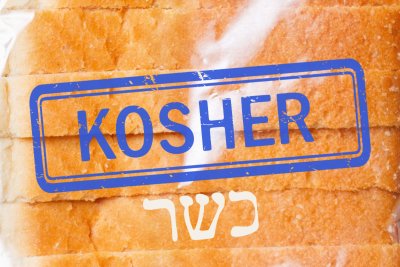Sustain / Real Bread Campaign / Articles
Kosher bread
What does a kosher certification mark on bread / industrial dough products mean?

According to kashrut (Jewish dietary laws), flour, water, yeast, salt (and most other ingredients commonly used to make plain Real Bread) are pareve (neutral) and so generally acceptable to Jewish dietary requirements.
Why, then, do some Real Bread bakers (and some industrial dough fabricators) choose to secure kosher certification?
Please note that this is only a brief introduction, rather than a definitive guide. It doesn't include the Yashan / Chadash grain rule, for example. For authoritative information (and for answers to any questions you might have about) kashrut / Jewish food principles and practices, please contact a kosher certification body.
What does it mean?
In short, a kosher certification mark on a loaf simply says that it doesn't contain anything that a person following Jewish dietary requirements cannot eat.
Kosher certification does not indicate or imply that the food can only be eaten by Jews. Nor does it mean that something specific has been added to the product.
This is a very basic introduction. We've listed some places to seek authoritative information and guidance below the article.
Pareve
Plain bread is usually pareve, as are plain industrial dough products - though see notes below.
Broadly speaking, food that doesn't containing any meat or dairy product is considered pareve (neutral) by Jewish food laws. Eggs and fish can be pareve if they meet certain requirements. Foods lose their pareve status if the share production equipment / lines with treyf ingredients (see below), or there is other risk of cross 'contamination'.
Kosher
Loosely translated, kosher means correct, genuine or fit, in the sense of fit to eat. Some animals (e.g. cows and sheep) and most poultry can be kosher, if they are prepared according to kashrut requirements. Fish with fins and easily removed scales are kosher. Foods cannot be certified kosher if they contain any treyf ingredients or additives; if produced on equipment / lines shared with treyf food / ingredients; or there is other risk of cross 'contamination'.
As plain bread / industrial dough product doesn't usually contain any animal or dairy product, it be certified kosher easily, as long as there's no risk of 'contamination' - see above. If the product does include animal or dairy products, they must be certified kosher.
Pas Palter and Yisroel
Certified kosher bread / baked products fall into two categories:
- Pas Palter: made without the involvement of an observant Jew.
- Pas Yisroel / Yisrael: made by (or with the participation of) an observant Jew.
Pas Yisroel is preferred / encouraged between Rosh Hahhanah and Yom Kippur, while some Jews choose to eat it more often or always.
Treyf
Foods that are forbidden by Jewish food law are known as treyf / treif. They include (but aren't limited to):
Ingredients
- Pork and products of porcine (pig) origin, such as lard and pork gelatine.
- Eggs with bloodspots.
- Shellfish, crustaceans and non-scaly fish.
- Some poultry.
- Meat that was not prepared according to kashrut rules.
- Products (e.g. eggs, milk) of any non-kosher animal / bird / fish.
- Insects - no flour weevils / beetles or cricket flour!
All ingredients have to be listed on the label.
Additives
- Glycerine / glycerol (E422), if of porcine (pig) origin. Used in some industrial flatbreads and gluten-free products.
- Emulsifiers, including mono-and diglycerides of fatty acids (E471), diacetyl tartaric acid esters of mono- and diglycerides of fatty acids (E472e), sodium stearoyl-2-lactylate (E481), if of porcine of other non-kosher origin.
All additives have to be listed on the label. Additives are not used in Real Bread making.
‘Processing aids’
- Phospholipase A2, if of porcine or other non-kosher origin.
- L-cysteine hydrochloride, if produced from pig bristles, feathers from uncertified poultry or other non-kosher origin.
Food labelling law allows manufacturers to choose not to declare the use of an additive if it is deemed to be a ‘processing aid’. ‘Processing aids’ are not used in Real Bread making.
‘Processing aids’ and other additives can be produced by a range of means from a variety of sources (animal, vegetable, microbial, fungal etc.)
From the Stick One on ‘em investigation conducted by the Real Bread Campaign in 2009, we concluded that it was highly unlikely that any industrial dough fabricator was knowingly using any processing aid of animal or human origin.
Why a kosher mark on a plant based product?
Many certification marks effectively say: people who can choose to buy and eat this product include those who have these particular dietary requirements. You might see the kosher certification mark next to vegan, vegetarian or halal ones as complementary, visual assurances that the product meets each specific set of requirements.
(It might also be part of an industrial food producer's quest for extra things they can use in their marketing - like putting 'high protein' on the pack of something that's naturally high in protein, or 'gluten free' on a type of food that rarely if ever contains it.)
Is kosher the same as halal?
While there are some similarities between principles and practices of Jewish and Islamic food laws, kosher and halal aren't exactly the same.
See also
Kosher certification bodies include:
Published Monday 17 November 2025
Real Bread Campaign: Finding and sharing ways to make bread better for us, our communities and planet.

